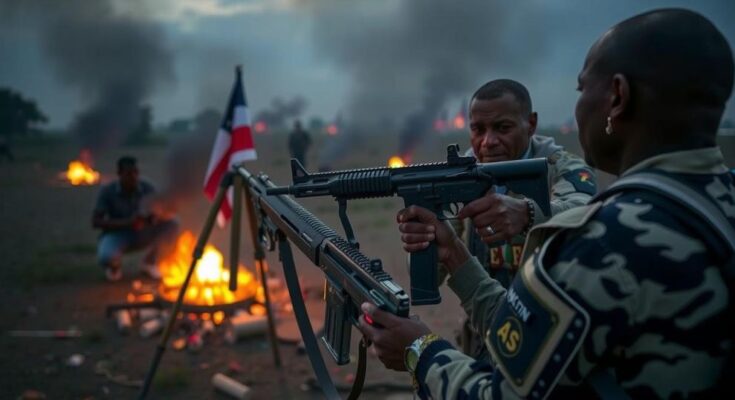Amnesty International alleges that French military technology is being deployed in Sudan’s civil war in violation of a UN arms embargo. The report reveals that the RSF militia is utilizing vehicles equipped with the French-made Galix defense system. Amnesty has called for the French government to halt arms supplies to the UAE and proposes expanding the embargo to all of Sudan amid ongoing allegations of severe human rights violations.
Amnesty International has reported that French military technology is being utilized in the ongoing civil conflict in Sudan, which contravenes a United Nations arms embargo. The organization alleges that the Rapid Support Forces (RSF) militia is employing vehicles equipped with the Galix defense system, manufactured in France, within the Darfur region amidst the fighting against the Sudanese army. Amnesty’s Secretary General, Agnès Callamard, emphasized that the deployment of these French-designed weapons on the battlefield highlights inherent risks of human rights violations. Furthermore, there has been no official response from French authorities regarding these claims, while the United Arab Emirates, known for providing military support to the RSF, has previously denied equipping the militia. Amnesty International has requested the French government to prevent its companies from supplying the Galix system to the UAE, asserting that the system’s presence in conflict zones could be used to commit further abuses. The organization’s findings include verified images of destroyed vehicles with the Galix system still visible. Amnesty also raised concerns about the efficacy of France’s export controls and has urged a reevaluation of arms transfer authorizations. Originally, the UN established an arms embargo in Darfur in 2004 due to grave accusations of ethnic cleansing. Due to the current civil strife, Amnesty proposes extending this embargo to all of Sudan and strengthening oversight mechanisms. The RSF, under the leadership of General Mohamed Hamdan Daglo, has been engaged in intense combat with Sudan’s regular military under General Abdel Fattah al-Burhan since April 2023. This conflict arose from a power struggle between former allies, leading to significant loss of life and displacements. Both factions have faced accusations of war crimes, particularly the RSF regarding ethnic cleansing, which they have denied by attributing such acts to local militias. Amnesty International’s stance is clear: all nations should cease supplying arms, whether directly or indirectly, to the warring parties in Sudan.
The situation in Sudan has devolved into a brutal civil war, stemming from a power struggle between military factions, namely the Rapid Support Forces (RSF) and the regular Sudanese army. This conflict has been compounded by continued allegations of human rights violations, including ethnic cleansing and war crimes. The United Nations first imposed a weapons embargo in the Darfur region in 2004 due to severe human rights violations occurring there. The arms embargo sought to prevent further escalation of violence and conflict. Amnesty International is advocating for the embargo to be expanded to encompass all of Sudan and for more stringent controls on arms exports to the region, especially in light of these new allegations involving French weaponry.
In conclusion, Amnesty International’s findings highlight serious concerns regarding the use of French military technology in the Sudanese civil war, which violates the existing UN arms embargo. The report outlines the ramifications of supplying arms to conflict zones and underscores the necessity for more stringent oversight and controls on weapon exports. Amnesty’s call for an expanded arms embargo and the cessation of military supplies to all factions underscores the need for international accountability in maintaining human rights.
Original Source: www.bbc.co.uk




